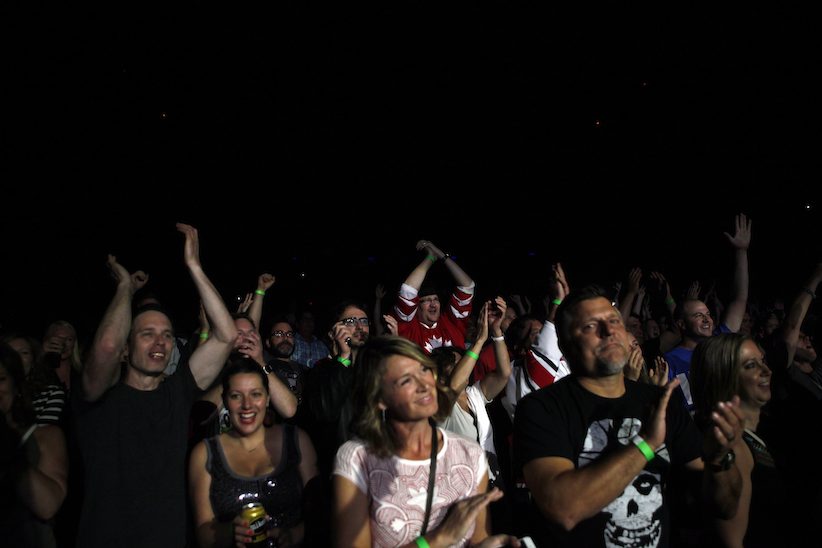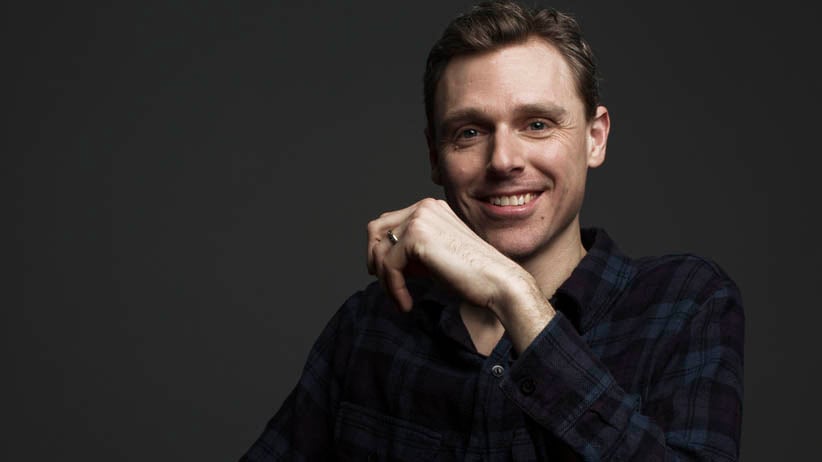Joel Plaskett on the Tragically Hip: ‘Lucky in their presence’
The Halifax singer/songwriter on the Hip in the Canadian landscape — pure and cool and weird

Canadian Musician and producer Joel Plaskett. (Darren Calabrese/CP)
Share
Update: Gord Downie died Oct. 17, 2017. Read his obituary here.
Joel Plaskett is a Halifax singer/songwriter who is often hailed as one of the true heirs of The Tragically Hip’s legacy, in terms of writing stadium-size, raw rock’n’roll married with the Canadian folk tradition, with explicit lyrical nods to a specific sense of place. He spent the ’90s with his high school friends in Thrush Hermit; in the 2000s he formed the Joel Plaskett Emergency, who opened for the Tragically Hip in 2004; you can hear Gord Downie thanking them on the 2005 live album That Night in Toronto.
What did the Tragically Hip mean to you as a kid?
A. I got Up to Here in Grade 9, when it came out. Then I found the first blue album [the 1987 debut self-titled EP]. I was a big fan of that and Road Apples; those two records got a lot of play from me. Then the whole Halifax thing took off, the Hermit got going, and I was very wrapped up in what was happening locally. When they were touring those early records, I was too young to see them in bars. The first two records—I can sing along to every song. “Little Bones” and the riff-rock stuff like that kicked my ass and continues to do so. There were songs after: “Courage,” that song too stuck with me. He dedicated “Courage” to Hugh McLennan, who is a first cousin of my grandfather. I met Hugh when I was in junior high; I remember him coming over to my grandparents’ house for dinner.
So you didn’t follow them in the ’90s, when they were ubiquitous?
A. There were always songs on my radar, but I didn’t have intimacy with the records. That goes with almost every band: [as a fan], you have two records you always go back to. After that I only knew the hits. I did see one show in the ’90s, maybe in the late ’90s, at the Metro Centre. It was when we got the opportunity to tour with them, in 2004, that my real understanding came, when I had an insight into the power of the band, Gord in particular as a frontman and lyricist, and the scope of their music in terms of how deep-reaching it was. It was an opportunity to learn a lot. They embody a sense of community. They never lost their love of cool Canadian rock’n’roll and songwriters. Their opening acts, you could walk the different sides of what they did, from the Rheostatics to Change of Heart to Eric’s Trip to the Constantines to Buck 65 to us. Their love of music is obvious.
MORE: We’re following the Tragically Hip—and their fans—across Canada
What do you think makes them special?
A. There’s a singularity to the band. I can hear the Stones and the R.E.M. in it and other things they were tapping, but they’re not copying any one band. Then the brew, and particularly what Gord has chosen to sing over these kind of songs, is a totally distinct recipe. It’s not a juxtaposition. That’s what interesting about the band. You hear a certain groove and you hear a phrase or story laid over it that turns you a bit sideways. It’s an unconventional quality that is unique to them. What more can you ask for than when you drop the needle on something and you can instantly say, “Oh, that’s the Tragically Hip.” You never think, “Oh, it could be something else.” Even though the records are produced differently, there’s something about the recipe the whole band has, not just Gord. I’ve been listening to them a lot over the last few months, as I’m sure many have—you feel an urgency to remind yourself what it is you love about the band. It is that unusual quality the band has at such a successful level is such an inspiration. This represents something cool about Canada that a hugely celebrated band that can be so weird. That gives me a lot of hope, that the art has pushed its way into the mainstream. It’s like Group of Seven paintings: you feel the intention is always there and pure but it’s also widely accepted in a way that makes you feel proud to be part of that landscape.
When they were at their commercial height, I feel like their ubiquity overshadowed how different they were from what else was going on. I knew a lot of artier people who thought the band were merely rubes with an interesting lyricist. That changed over time. The ’90s were very tribal.
If I were to be totally honest, if you talked to me in ’96, I might say, “I don’t know if I like this band.” (laughs) I’d have something critical to say about it because it was everywhere, and as a young man you’re trying to mark your own territory. It’s not that I actively disliked them. For me, it’s unveiled itself over time; my appreciation has deepened. I start to see what they were doing. I got out of my young indie rock snobby self, and realized that things they were doing that seemed so simple weren’t simple at all. As I’ve grown older, some songs resonate more, either the subject or the poetry and language that click in a way they didn’t for me back then.

What songs are you thinking of?
A. There are the big ones you love regardless, like “Ahead by a Century.” My favourite song that didn’t cross my radar at the time was “Bobcaygeon.” I was not listening to them at the time that song came out. But it didn’t register with me until I was in its presence live. A lot of people’s love for any band comes from seeing them live and watching them develop and feeling like you’re a part of that momentum. That kind of fandom stems from feeling like you were there at an early stage and there’s all this nostalgia built into it.
What’s your take on Downie’s writing style?
A. They have a couple of modes. Sometimes you think they’re just jamming and Gord’s just winging it. Other times the lyrics show up very crystallized and—not exactly clear, because there are always angles and tangents there. What’s really great is that there are these phrases that leap out and you grab on to them, despite the fact you don’t know what they mean to him or why they’re there, you develop your own relationship with them. You react even to the punctuation or the meter of the words in a very visceral way.
MORE: Spirit of the West’s Geoffrey Kelly on his band’s final show
You’re one of the few rock writers of the generation after the Tragically Hip who occasionally write explicitly about this country. How do you think they changed the landscape?
A. It’s not like I’m a super well-read person, but I have my peculiar interests. I have a lot of references in my music that only a few people might pick up on. And I know that when I mention Halifax or Edmonton, beers get cracked. I’m happy to do that, and I wear that badge as a Canadian, and people celebrate this location-based stuff that I evoke in my songs. But I’ve also written songs about Australia and other places I’ve been, or I’ll sing about Robert Mitchum in Night of the Hunter. I’m not reinventing any wheels; a lot of writers do that. But obviously people really pick up on what they relate to the most. Gord does sing about Canadian history and hockey, and it’s great to celebrate that. But Gord’s writing goes all over the place. It’s rich, and you can dig deeper than what most people associate with it.
In folk, country and especially hip-hop, the local is paramount; there is a distinct sense of place in the lyrics in all those genres. Whereas rock music doesn’t often do that. Most rock lyrics are still very generic and universal.
A. I remember a conversation in the Hermit days. We had this song called “North Dakota” on Sweet Homewrecker, and it was about being denied at the border. It was about being Canadian. But someone said to me, “Why don’t you write about where you’re from? Why do you write about American places?” That kind of stuck with me, that someone was taking this at face value; they thought the song was about North Dakota.
That’s very funny to me, because one of the Hip’s very first hits was about taking “the last American exit to the northland”—similarly identifying the narrator as Canadian in an indirect way.
A. Ha, that’s right, isn’t it? The more I travelled, the more I reflected on where I was from. The idea of this sense of regionalism in music for me became a lot more fascinating as I got into New Orleans music or Memphis music or this idea of being associated with a place. The Hip is a Canadian band that punches above its weight around the world, but they’re also distinctly from Ontario. As a guy from Nova Scotia, they somehow romanticize Ontario cottage country, which is an experience I don’t know. When I think of people in Ontario having a good time in the summer by a lake, I think of the Tragically Hip. (laughs) They evoke a sense of place even if you’re not from there. That’s what Springsteen did for Jersey: suddenly you can romanticize something that’s maybe pretty banal and make it cool. In rock music you mostly hear a lot of big universal sentiments, this weird middle ground that is always been less interesting than the peculiar. I always liked Vic Chesnutt, too, for that reason.
Did you ever talk to the band about songwriting?
A. They’re all quiet guys, I can’t say I got to know them too well. Talking to Gord—he’s not elusive, but he’s a listener. I’m a talker, and he’d just be silently engaging me. Then he’d say a few things that would be everything I should have said in a condensed form. That’s probably what makes him such a great wordsmith. He gives you just a few bits that you can chew on for a long time. All the contexts in which I’ve encountered him have been at a show or a tour. He came out to one of my shows once, which was such an honour. We were at the Horseshoe and he got up and we did a version of “Love This Town” and he riffs on a verse. You can find it on YouTube. That meant a lot to me.
Have you heard the new record?
A. Yes. Oh man, there’s a song on there, “Ocean Next,” that is so good. Tell me, because I don’t know, was that record all done before the news?
Yes it was. He was diagnosed in December, and it was finished shortly before that.
A. I think that, um, I don’t really—I mean, man, the whole thing just bums me out, with the exception of the fact that what they’re doing now is so inspiring. I’ve had a few people call me about the Hip in light of what’s going on. I feel lucky to merit that phone call because I’ve been in their proximity and I’m a fan. A lot of people have told me they first saw me opening for the Hip. That means a lot to me and I feel very blessed. Proud is a weird word, but seeing what they’re doing makes me want to stand up a little straighter, the grace with which they’re handling things. I think we’re lucky to be in their presence right now.
Michael Barclay is the co-author of Have Not Been the Same: The CanRock Renaissance 1985-95.
MORE ABOUT GORD DOWNIE:
- Gord Downie’s most memorable quotes
- Remembering the life and legacy of Gord Downie (1964 – 2017)
- Gord Downie: A timeline of his life and work
- Gord Downie: Canada’s humble genius
- Gord Downie (1964–2017): A Life in Pictures
- How we will miss Gord Downie and the Tragically Hip
- Ahead by a year: Remembering the Hip’s last show
- Under the covers: How Tragically Hip cover bands are paying tribute
